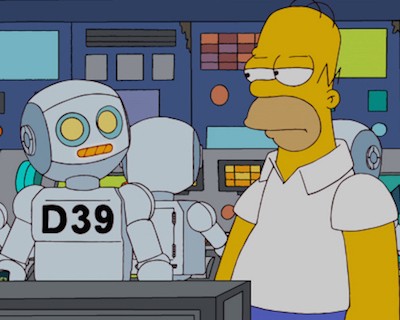Welcome to the Fourth Industrial Revolution. Get Ready to Hustle.
Since I know The Billfold’s readership fairly well, I bet there were at least a handful of us who spent elementary school reading books like Katherine Paterson’s Lyddie and wishing we could live through a major industrial revolution.

Wouldn’t it be exciting, to see the entire world change so quickly? To have so many possibilities suddenly open up for us? (To ask the librarian to help us define “moral turpitude?”)
Well, sometimes we get exactly what we wish for. The World Economic Forum just announced the Fourth Industrial Revolution:
There are three reasons why today’s transformations represent not merely a prolongation of the Third Industrial Revolution but rather the arrival of a Fourth and distinct one: velocity, scope, and systems impact. The speed of current breakthroughs has no historical precedent.
Quick! Tell us about the possibilities!
Ordering a cab, booking a flight, buying a product, making a payment, listening to music, watching a film, or playing a game — any of these can now be done remotely.
Okay, I mean, all of that is pretty great, but what about our possibilities? What kind of jobs can we expect from this new industrial revolution?
From NBC News:
While economists, entrepreneurs and policymakers huddled in Davos, Switzerland, last week to discuss the “fourth industrial revolution” and its impact on the global workforce, almost one in three American workers got up in the morning and faced their boss — in the bathroom mirror.
We get to be our own boss? That sounds AMAZING!
Nearly 54 million Americans — or roughly a third of the U.S. workforce — are involved in some kind of freelance, self-employment or “gig” economy work. That’s up about 700,000 since 2014, according to the Freelancers Union.
Wait. No. You put “gig” in quotes. We know what it means to put something in quotes. So does NPR:
That tone of insouciance has made “the gig economy” the predominant name for what’s being touted as the industrial revolution of our times. The lifetime job is history, we’re told, a victim of technology and the logic of the market. Instead, careers will be a patchwork of temporary projects and assignments, with the help of apps and platforms with perky names like FancyHands, Upwork and TaskRabbit.
But back to those freelancers. Adding 700,000 people to the freelance workforce only represents a 1.3 percent increase in the number of Americans freelancing. On the other hand, those 700,000 people could fill a city the size of Seattle and still have 50,000 people left over to move to Portland.
And no, they’re not all TaskRabbits. As NBC News explains:
In its annual report, the Freelancers Union defines five kinds of freelancers: ultra-small business owners, independent contractors, temporary workers, “moonlighters” who have a full-time job and do independent work on the side, and “diversified workers,” part-time workers who also cobble together a series freelance gigs to get by.
So, okay, maybe that’s not that bad! We can handle this! I’ve been handling it for years now—and I’ve always said that becoming a freelancer is the best thing I did for my career.
Is there anything else we have to look forward to, NBC?
“The greatest disruption … could be experienced by workers who have so far felt immune to robotic competition, namely those in middle-skill professions,” [UBS bank analysts] said.
So some of us will be freelancers and others of us will be employees and all of us will be competing with robots. All right. That’s okay. We can still do this.

NBC News even suggests that a robot might someday—gasp!—be our boss, which I find a little hilarious because I have been working for various types of robots since I started freelancing. You’ll argue that the automated systems that track and rate online writing, handing out both assignments and cash, are not precisely robots. They’re programs. But I have definitely worked jobs where the majority of my work was uploaded to one of these programs, and the program gave me money in exchange. How different is that from having a robot as your boss?
The big problem with all of this, of course, is the money. NBC News states that “2.9 million freelancers earned more than $100,000 last year,” but it also states that we are well into a world where companies hire and fire staff at will, and that both employees and freelancers will have to prepare for frequent layoffs and a constant hustle.
NBC News doesn’t state the other big problem with hustle-based remote employment navigated via online programs, but The Cut does:
In a recent New Yorker profile of Ford Foundation president Darren Walker, Walker admitted that he’d had to train himself to not email his staffers during off hours, or else they “became distressed and resentful . . . because they felt obliged to respond quickly.” Slack, on the other hand, makes a simple DM from your boss at 9 p.m. on a Thursday seem less threatening. “Oh, I’ll just answer her question now,” you think, “so she believes I’m still at this party though I left a long time ago for a different, better one.” The different, better party is, subsequently, your real life. With your real friends. And checking in on Slack, no matter how harmless it feels, is one way of pushing an eight-hour workday to 10, 12, 18 hours.
So. Freelancing, hustling, gigs, robots, 18-hour workdays, and the knowledge that it could all change at any moment; that you could literally receive a text message announcing that your employer has shut down:
Several hair stylists are out of a job this week after getting fired from their downtown Seattle hair salon, SEVEN Salon, via a text message.
“SEVEN regrets to inform you that our Seattle Salon & Educational Academy has ceased operations,” the text begins. “We have closed for business reasons.”
Someday they’ll write books about us. They’ll put soft-focus images of young women on the cover, and girls will sit in classrooms and wish that they could have been part of all of this, the amazing Fourth Industrial Revolution where everything changed so quickly.
Until then, get ready to hustle—because that’s what the reality of this industrial revolution is going to look like, at least from my perspective.
Support The Billfold
The Billfold continues to exist thanks to support from our readers. Help us continue to do our work by making a monthly pledge on Patreon or a one-time-only contribution through PayPal.
Comments